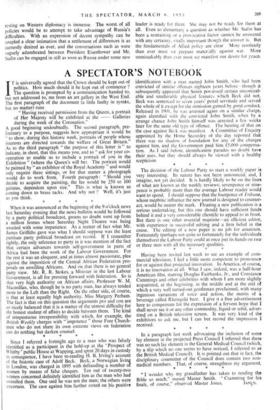Since I referred a fortnight ago to a man who
was falsely identified as a participant in the hold-up at the ' Prospect of Whitby' public House at Wapping, and spent 20 days in custody in consequence. I have been re-reading H. B. Irving's account of the historic case of Adolf Beck. Beck, a Norwegian living in London, was charged in 1895 with defrauding a number of women by means of false cheques. Ten out of twenty-two women concerned definitely identified him as the man who had swindled them. One said he was not the man; the others were uncertain. The case against him further rested on his positive identification with a man named John Smith. who had been convicted of similar offences eighteen years before—though it subsequently appeared that Smith possessed certain unconceal- able and unalterable physical features which Beck did not. Beck was sentenced to seven years' penal servitude and served the whole of it except for the remission gained by good conduct. Released in 1901, he was arrested again on a similar charge, again identified with the convicted John Smith, when by a strange chance John Smith himself was arrested a few weeks later for the same old type of offence. The hearing of that on the case against Beck was manifest. A Committee of Enquiry appointed by the Home Secretdry of the day reported that there was no shadow of foundation for any of the charges against him, and the Government paid him £5.000 compensa- tion. As I said before, identification parades no doubt have their uses, but they should always be viewed with a healthy scepticism.


































 Previous page
Previous page